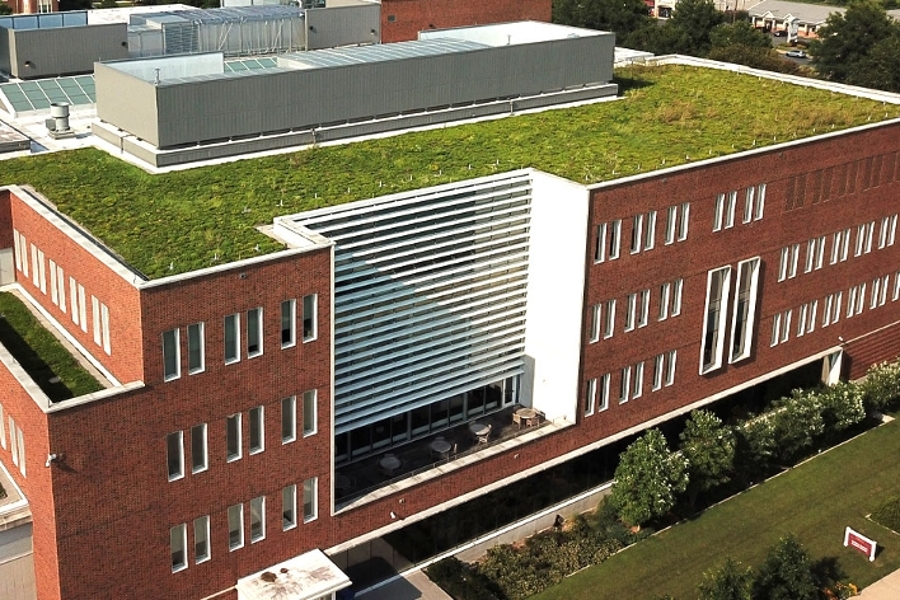SALISBURY UNIVERSITY AMONG 30 MOST SUSTAINABLE UNIVERSITIES IN THE US ACCORDING TO PRINCETON REVIEW

Salisbury, MD-According to The Princeton Review, Salisbury University is among the 30 most sustainable colleges and universities in the U.S.
For the 15th consecutive year, The Princeton Review, in partnership with the U.S. Green Building Council (USGBC), has included S.U. in its Guide to Green Colleges. This publication highlights impressive environmental and sustainability programs at campuses throughout the U.S. and select institutions in Canada.
This year, S.U. is No. 29 in the publication, representing the University's highest position since the rankings began in 2010.
"Since the early 1990s, Salisbury University has been a leader in sustainability on the Eastern Shore," said President Carolyn Ringer Lepre. "From starting one of the area's first corporate recycling programs more than 30 years ago, to our many USGBC Leadership in Energy and Environmental Design (LEED)-certified buildings, S.U. has taken many steps to help protect our environment while providing the best education and resources we can for our students. We are thrilled that The Princeton Review has recognized our efforts, naming S.U. one of the most sustainable campuses in the nation."
The Princeton Review guide is based on a survey of hundreds of colleges nationwide. Questions explore institutional commitment to areas including LEED building certifications, environmental studies programs, alternative transportation, recycling and conservation programs, and more.
The 511 colleges in the guide were selected based on "green rating" scores from summer online profiles and annual guidebooks.
In 2008, S.U.'s Conway Hall (formerly the Teacher Education and Technology Center) became the first LEED-certified new construction project on the Eastern Shore, earning Silver status. Since then, 10 other new or renovated campus buildings have earned LEED Gold or Silver certification, including Perdue Hall, Sea Gull Square, Sea Gull Stadium, the Patricia R. Guerrieri Academic Commons, and Pocomoke, Wicomico, Manokin, Nanticoke, Chester and Choptank residence halls.
Upon its reopening in 2026, Blackwell Hall, currently undergoing renovations, is expected to join the S.U.'s LEED certification list as one of the first net-zero buildings in the University System of Maryland (USM), operating with a zero net carbon footprint.
S.U. also is home to the Eastern Shore's first public electric vehicle charging stations. Other alternative transportation initiatives include a bicycle-friendly campus, complete with "Fixit" stations and bike storage buildings for residents, and a bike lane that leads from the University to downtown Salisbury.
The Environmental Studies Department offers a major and minor and features award-winning faculty and staff, including renowned environmentalist and author Tom Horton. S.U. also has several environmentally related academic programs in the geo-, biological, and physical sciences.
Other initiatives include a trayless dining hall, a solar parking canopy producing enough electricity annually to power three campus residence halls, and building innovations such as the "green roof" atop the Patricia R. Guerrieri Academic Commons, which allows a blanket of plant life to serve as a stormwater filtration system and help keep the facility cooler by reducing the roof's heat island effect.
In addition, S.U. was the University System of Maryland's first Bee Campus USA honoree, recognized for creating sustainable habitats and fostering ongoing dialogue to raise awareness of the role pollinators play in the greater community. In 2022, the University also was named a "High Flyer" Maryland Bird Campus for providing a healthy space for birds.
S.U. also is a nationally recognized Tree Campus, accredited as a Level III arboretum by the ArbNet Arboretum Accreditation Program and Morton Register of Arboreta.
To download the Guide to Green Colleges visit www.princetonreview.com/college-rankings/green-guide.
Learn more about S.U. and opportunities to Make Tomorrow Yours at www.salisbury.edu.
Source: Salisbury University Press Release


